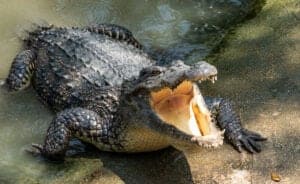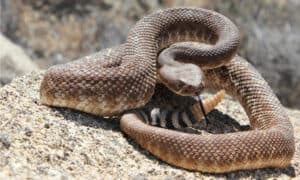As spring heads into full swing and summer is on the way, the likelihood of running into a snake begins to increase. Thankfully, many of the snakes that you will likely encounter are totally harmless and can actually help keep other pest populations in check. One of the most common, least harmless, and most helpful snakes around is the rat snake. Georgia is home to many species of this reptile which also calls other states home. Today, we are going to discuss three species of rat snake in Georgia and learn some ways to identify them correctly. Let’s get started!
What Is a Rat Snake?
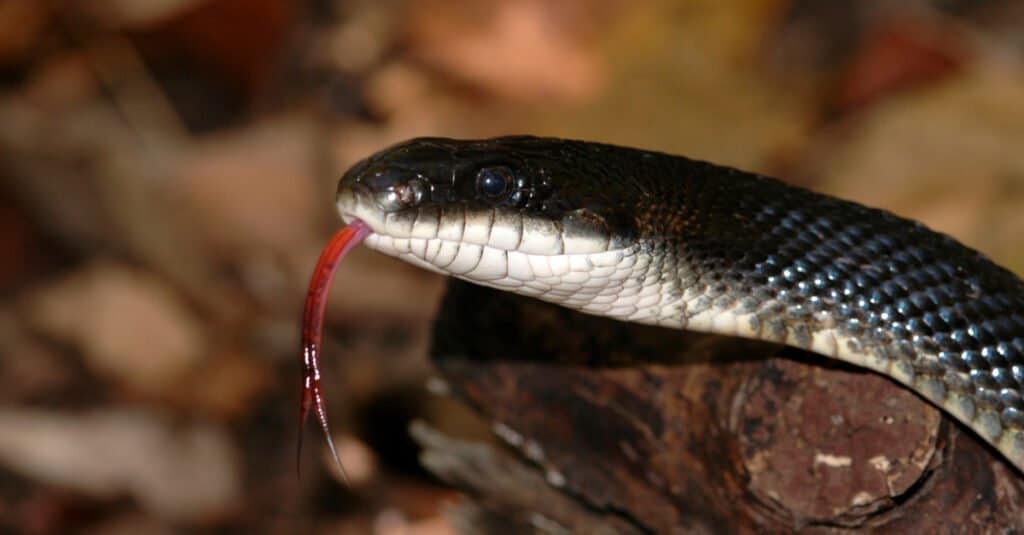
There are 14 species of rat snake in the United States.
©Rusty Dodson/Shutterstock.com
Rat snakes (often referred to as ratsnakes without a space) are a large group of snakes that belong to the subfamily Colubrinae. All rat snakes are medium to large constrictors that primarily eat rodents, hence their name. Almost all of them live in the Northern Hemisphere, and they can be grouped into New World and Old World populations. As the United States is in the New World, most people are only familiar with the species within that group.
The New World is home to 14 species of rat snake. Georgia itself possesses three of them. Additionally, there are other species that are closely related to rat snakes genetically, even though they don’t share the same common name as a rat snake would.
Let’s explore and learn to identify all the rat snakes in Georgia!
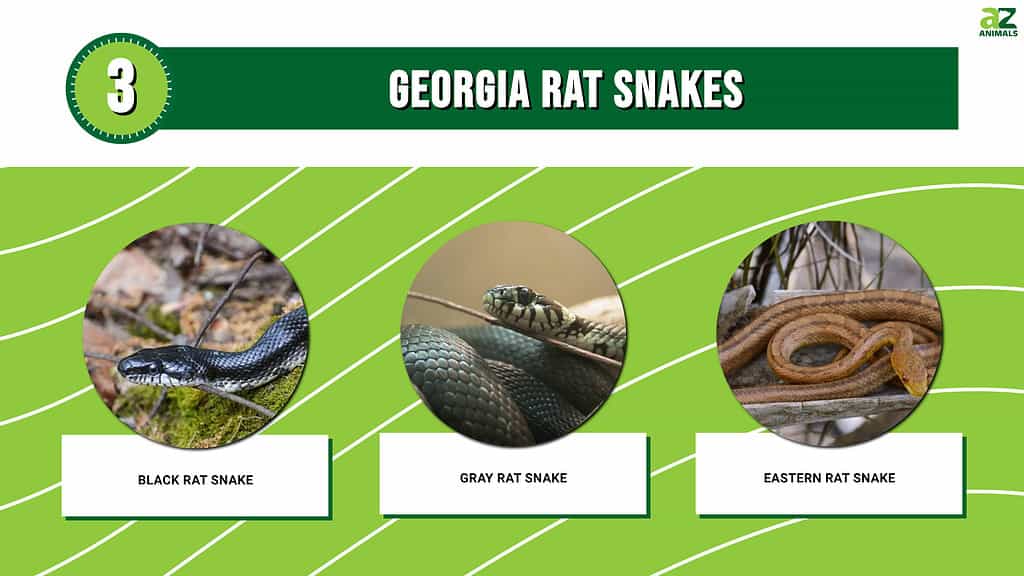
A List of Rat Snakes in Georgia
There are three species of rat snake in Georgia with the name “rat snake” and one rat snake that isn’t actually called a rat snake (confusing, right?). Here are the three species and some easy ways to identify them.
Black Rat Snake
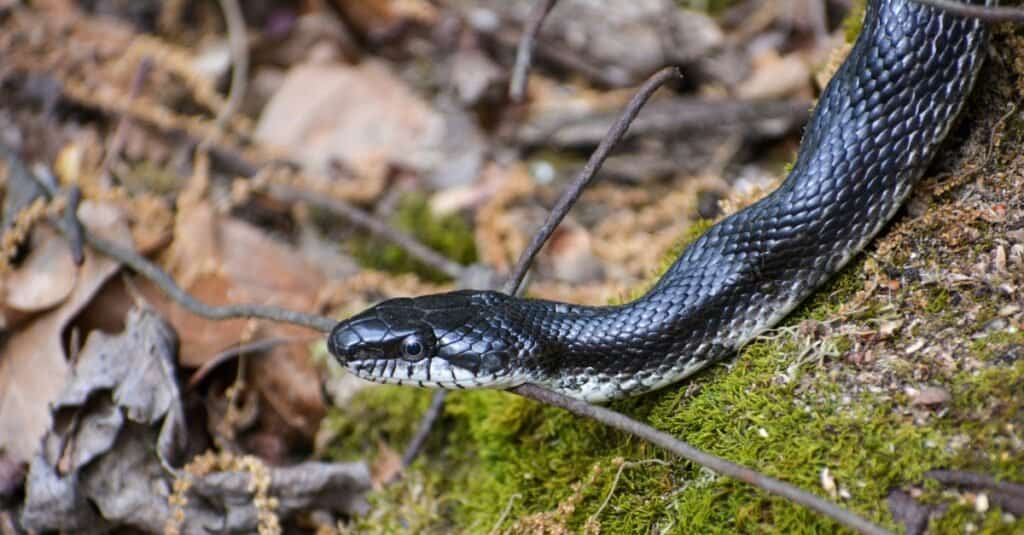
Black rat snakes are shiny, and black, and have white bellies and chins.
©Realest Nature/Shutterstock.com
The black rat snake, sometimes referred to as the black ratsnake, is one of the most common ratsnakes in North America. They go by many names, including western rat snake, black rat snake, pilot black snake, and simply black snake. Black rat snakes are non-venomous and are the largest and most powerful snakes in Georgia. They kill their prey through constriction (like all rat snakes) and primarily feed on rodents.
A specific coloration of black rat snakes live in Texas and are referred to as Texas rat snakes, although they aren’t recognized as different subspecies.
Identifying black rat snakes: Black rat snakes are black and shiny with a slight white shading between some of the scales. Their bellies are white or cream, and their throat and chin are usually visibly white. They have small heads with round eyes and black tongues. Adults can reach 7 feet in length, making them one of the longest snakes in the United States.
Black rat snakes can be found in the northern third of Georgia. They are generally a northerly distributed snake and brumate during the cold months.
Gray Rat Snake
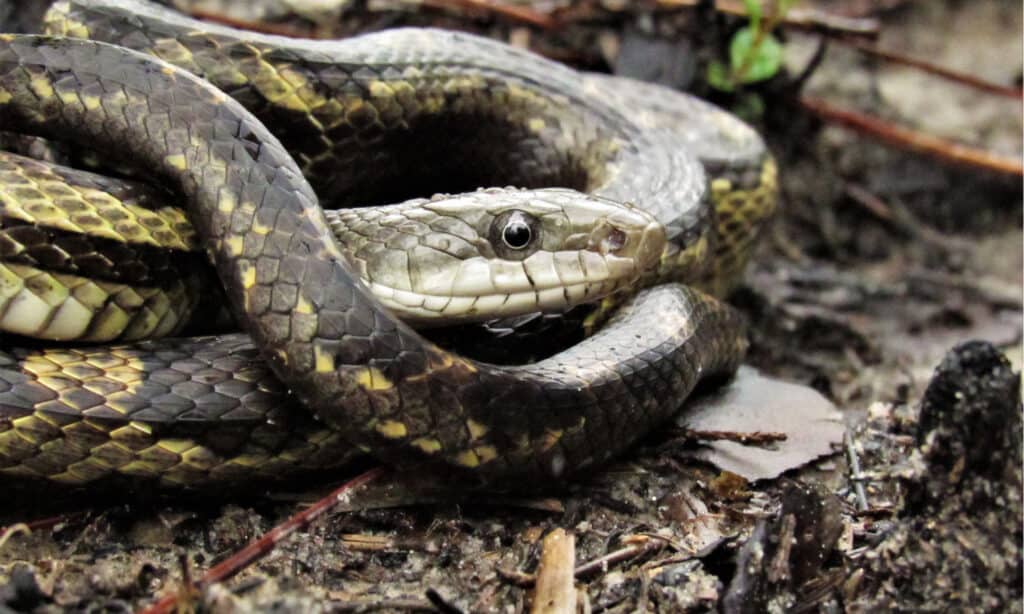
Gray rat snakes are gray and have dark patterns across their back and belly.
©Gabbie Berry/Shutterstock.com
The gray rat snake is the most common species of rat snake in Georgia. It goes by many names, including gray rat snake, oak snake, and white oak snake. Although they are a distinct species of rat snake, they often interbreed with black and eastern rat snakes where their ranges intersect.
Identifying gray rat snakes: Gray rat snakes have light gray bodies with large black or brown splotches down their back. They generally have gray bellies with small, dark patterns that can appear as spots or splotches. Adults can grow to 3-6 feet in length.
Gray rat snakes live through most of the state. Due to their prevalence, they are usually the most common snakes that humans encounter. However, they are non-venomous and help keep rodent populations in check.
Eastern Rat Snake
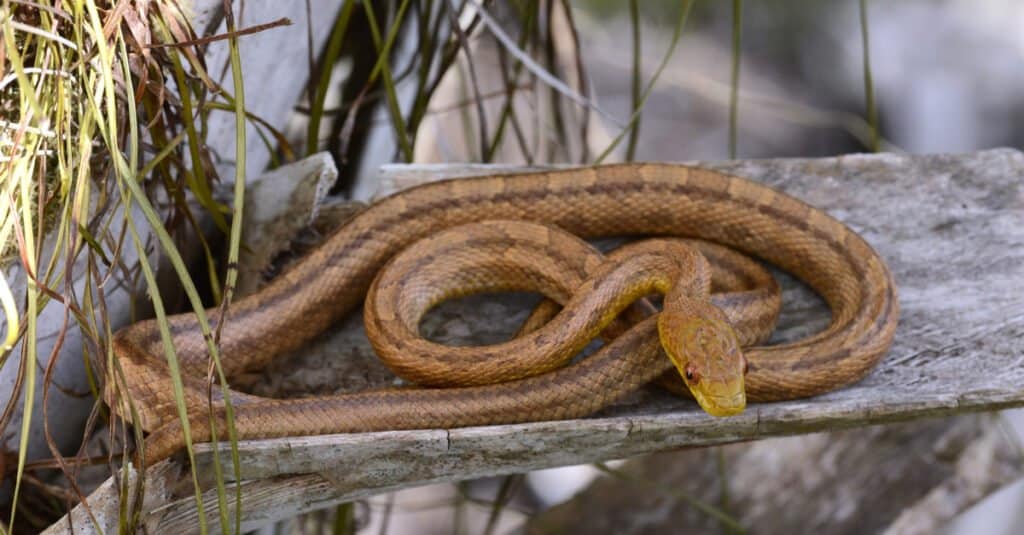
The juvenile eastern rat snake has brown to black blotches on a gray background and a somewhat squared-off snout.
©Patrick K. Campbell/Shutterstock.com
The eastern rat snake was once regarded to be the same species as the black rat snake but has since been split off. This snake goes by many names, including rat snake, chicken snake, yellow ratsnake, and the Everglades rat snake (in Florida).
Identifying eastern rat snakes: It can be rather tough to tell the difference between some eastern rat snakes and black rat snakes. In some cases, eastern rat snakes come in a shade of yellow with stripes down their back, making identifying them easy. In other morphs, however, they look nearly identical. Eastern ratsnakes are generally regarded as having smoother scales than black rat snakes (a trait known as “keeling”). Another way to tell is size, as eastern rat snakes are generally smaller. Additionally, their tails are gray. Adults can grow to 3-6 feet in length.
Eastern rat snakes are found across most of the state and are non-venomous.
Summary of 3 Georgia Rat Snakes
Here’s a recap of the three types of rat snake species in the state of Georgia that we looked at.
| Number | Snake Species | Common Names | Length | Distribution |
|---|---|---|---|---|
| 1 | Black Rat Snake | Western rat snake, black rat snake, pilot black snake, black snake | 7 feet | Northern third of Georgia |
| 2 | Gray Rat Snake | Gray rat snake, oak snake, white oak snake | 3-6 feet | Throughout most of Georgia |
| 3 | Eastern Rat Snake | Rat snake, chicken snake, yellow ratsnake, the everglades rat snake (in Florida) | 3-6 feet | Throughout most of Georgia |
Similar Snakes Related to Rat Snakes
Corn Snake
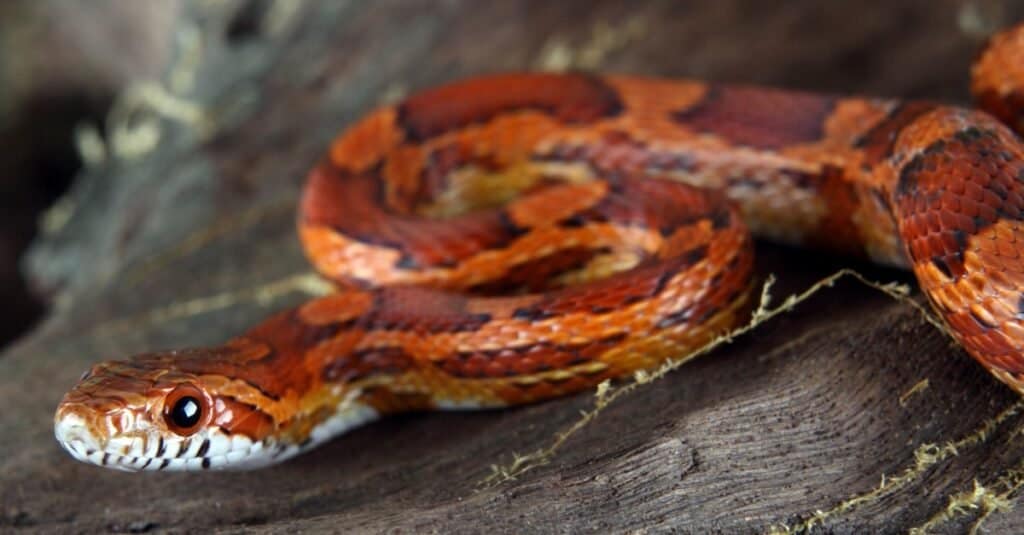
Corn snakes are red and orange with white bellies and patterned backs.
©Enrique Ramos/Shutterstock.com
Although not commonly known, corn snakes are actually a species of rat snake. In some regions, they are referred to as red rat snakes. Corn snakes are common pets but are found in the wild, namely in the southeastern United States.
Corn snakes are easily distinguished from most rat snakes as they have different colors and patterns. Most corn snakes have a red and orange body with a white or cream belly. Their backs are covered in orange spots or splotches that are often ringed in black. They are smaller than other species of rat snake, only growing to 1-3 feet in the wild.
Garter Snake
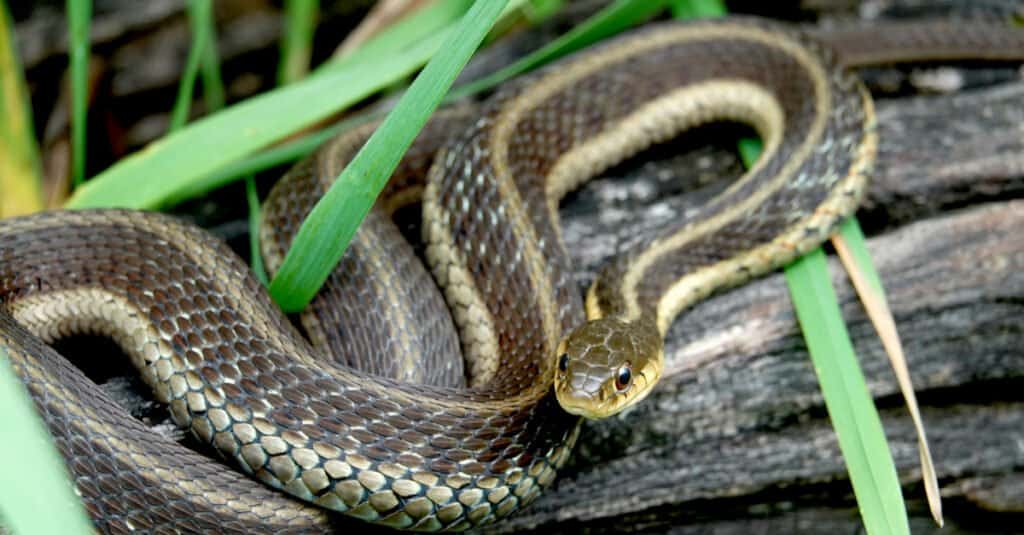
Eastern garter snakes are brown or black with three yellow stripes running from head to tail.
©Erik Agar/Shutterstock.com
The primary species of garter snake in Georgia is the eastern garter snake. Garter snakes are generally much smaller than rat snakes and only reach lengths of 12-26 inches. The easiest way to identify garter snakes is by the three stripes that run down their body. These stripes are usually yellow or white and are set on a dark body.
Eastern garter snakes are usually gray or brown with yellow or white stripes running down their body, but some specimens in southern Georgia and Florida have a bluish tint to their sides. Additionally, some individuals have checkerboarding instead of stripes, but it is somewhat uncommon.
The photo featured at the top of this post is © Rusty Dodson/Shutterstock.com
Discover the "Monster" Snake 5X Bigger than an Anaconda
Every day A-Z Animals sends out some of the most incredible facts in the world from our free newsletter. Want to discover the 10 most beautiful snakes in the world, a "snake island" where you're never more than 3 feet from danger, or a "monster" snake 5X larger than an anaconda? Then sign up right now and you'll start receiving our daily newsletter absolutely free.
Thank you for reading! Have some feedback for us? Contact the AZ Animals editorial team.



